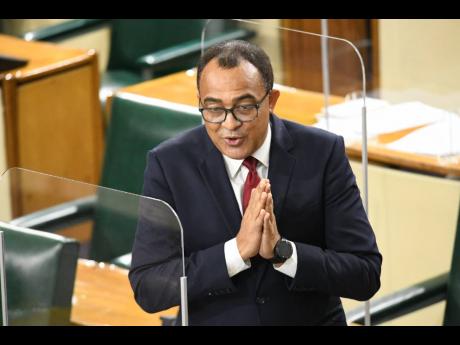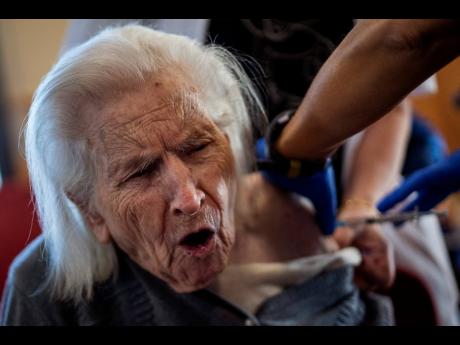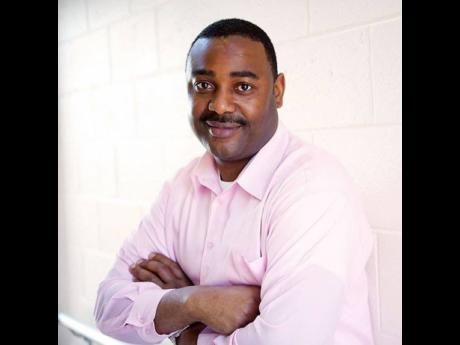Hold off old - Elderly with frail health warned against taking vaccine
An international health expert has cautioned Jamaica against vaccinating already frail senior citizens following Tuesday’s disclosure by Health Minister Dr Christopher Tufton that front-line workers and the elderly will be among the first estimated...
An international health expert has cautioned Jamaica against vaccinating already frail senior citizens following Tuesday’s disclosure by Health Minister Dr Christopher Tufton that front-line workers and the elderly will be among the first estimated 125,000 Jamaicans to receive the AstraZeneca vaccine later this month.
There is also concern that the Holness administration has been too slow in rolling out an aggressive public education campaign to blunt vaccine resistance, particularly among the adult population.
Dr Wilmore Webley, associate professor of microbiology at the University of Massachusetts, said that while the AstraZeneca vaccine has proven to be safe and effective among the young in trials, administering it to persons with fragile health or who have a short time to live would not be wise.
“If these vaccines actually work the way they are supposed to, they will stimulate a really strong immune response, and that strong immune response is manifested by fever,” Webley told The Gleaner on Tuesday.
Two or three days of “intense immune response” might be “detrimental” to the health of some elderly patients, said the Jamaica-born scientist.
He has urged senior citizens to be vetted by their physician before taking the jab.
“If you have a car that is fragile and is breaking apart, you don’t drive it at sustained high speeds; you might just blow something,” he said.
The efficacy rate of AstraZeneca, though reportedly lower than the Pfizer and Moderna options, are sufficiently potent, said Webley.
Jamaica is set to receive between 146,400 and 249,600 doses of the AstraZeneca vaccine by the middle of February under the COVAX Facility, Tufton said in Parliament on Tuesday.
An initial commitment was made for 900,000 doses, which would be sufficient to vaccinate 16 per cent, or 450,000 Jamaicans, by the end of 2021, but Tufton warned that this might be adjusted based on global circumstances.
That appeared to be an acknowledgement of heightened anxiety over the global race led by rich countries to corral vaccines – a development Chief Medical Officer Jacquiline Bisasor-McKenzie sought to dismiss last week when she said more than two billion doses were already secured under COVAX.
Jamaica will need to put in place the necessary indemnity and liability frameworks in order to complete the agreement directly with AstraZeneca, and finalise details of the procurement process under COVAX.
Webley believes a more intense public education campaign should have been in effect long before now. That might compromise the Government’s 16 per cent target which some medical experts have criticised as unambitious. That would present a massive deficit in the country reaching herd immunity with inoculation of 60-70 per cent of the population.
“They should have already rolled out several public-service campaigns, talking about the vaccine, being honest, upfront about the side effects that have been seen in clinical trials, talking about the pros and cons of taking the vaccine,” said Webley.
The associate professor also insisted that the Government should have sought buy-in by an increasing drumbeat about the rigorous testing regime vaccines undergo.
However, permanent secretary in the Ministry of Health & Wellness, Dunstan Bryan, does not share the view that his technocrats should have done more in this regard.
“We have been in the public domain speaking about vaccines for the past two months and I think that there is a lot of public conversation happening,” he told The Gleaner on Tuesday.
“The campaign is a continuous conversation with the public.”
Webley made one suggestion as Tufton and his team prepare to boost confidence and subscription among the general public.
“Give it to those who are willing to take it without forcing other people to take it initially, and then after people look and see that those that have taken it are fine, they will come on board,” he said.
The country also continues to explore other avenues for securing additional vaccines. These include the CARICOM Secretariat, which has committed 250,000 doses of the AstraZeneca vaccine to Jamaica from the 1.5 million doses that have been allocated to the Caribbean Public Health Agency by the African Medical Supplies Platform. Discussions are also under way with India, China, Cuba, Mexico, and the United Kingdom for additional doses.
Jamaica recorded 538 new COVID-19 cases in the last five days and nine deaths. Overall deaths are at 353 and infections nearly 16,000.
But while the vaccine offers hope for reducing the infections, the health minister said that the anti-vaxx movement was a clear threat. The HPV vaccine take-up rate, in the region of 50 per cent – below the anticipated 70 per cent target – may be a grim omen for the coronavirus vaccine.
“The anti-vaxx movement, those persons who do not believe in vaccines and the administration of vaccines, immunisation, have become a louder and more powerful voice and a resource voice globally,” said Tufton.



